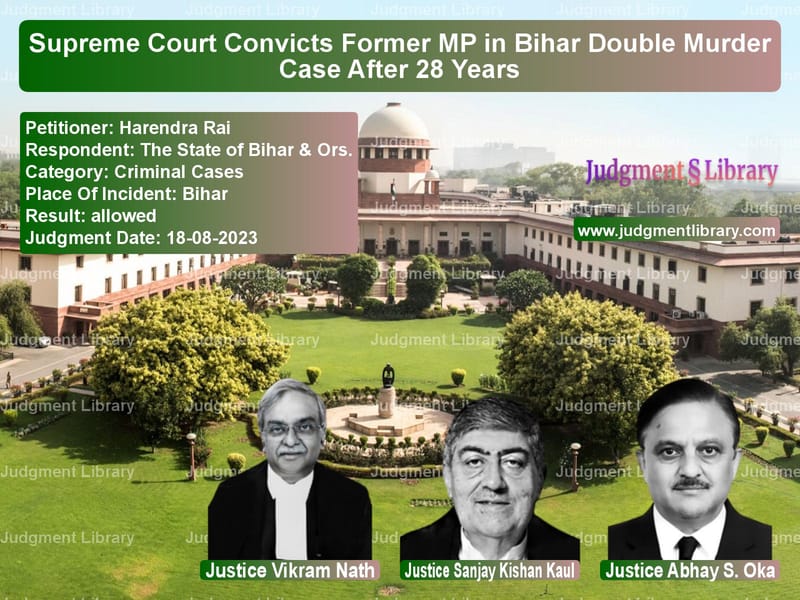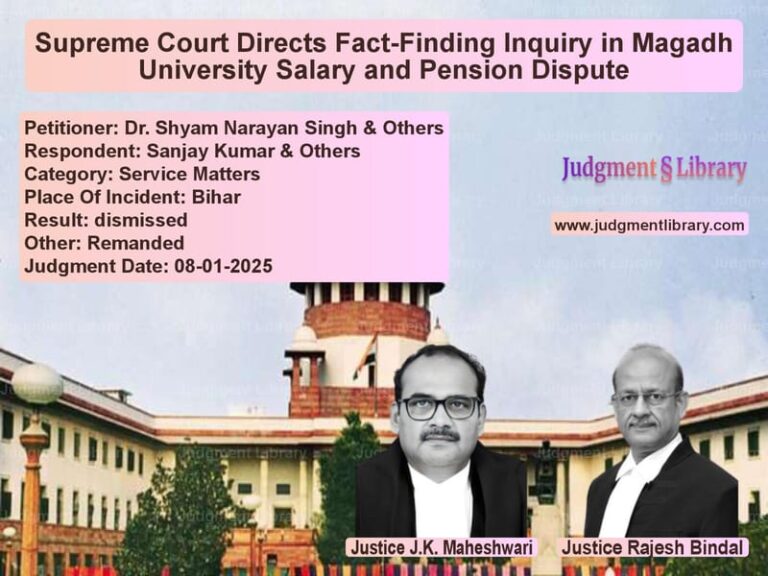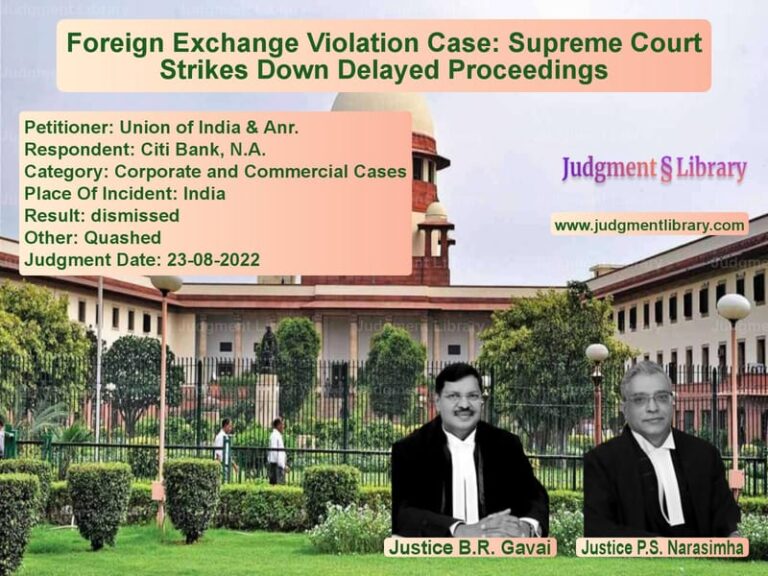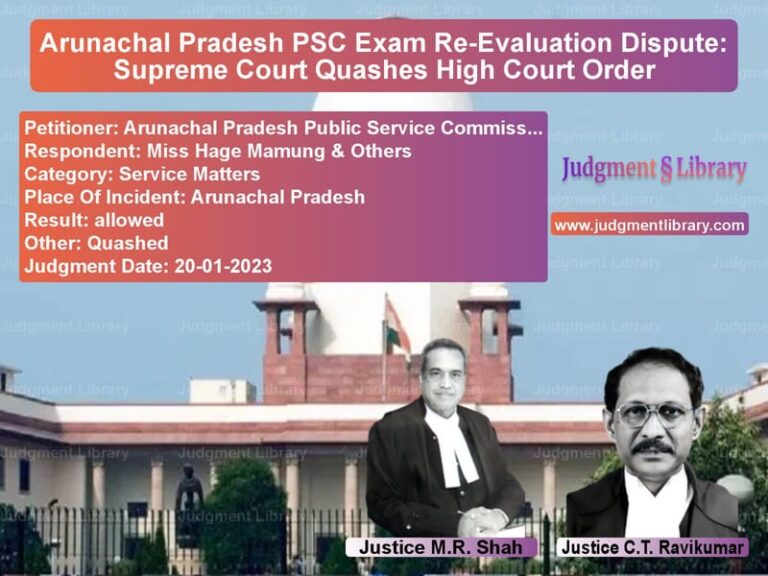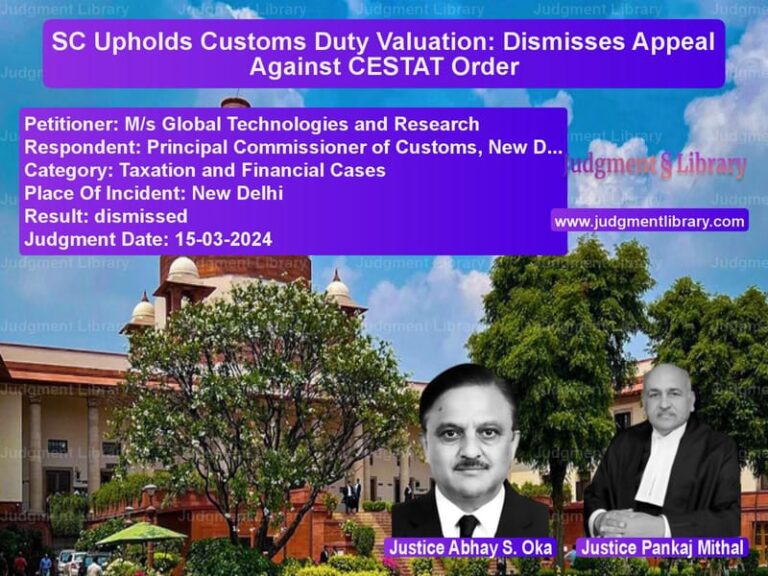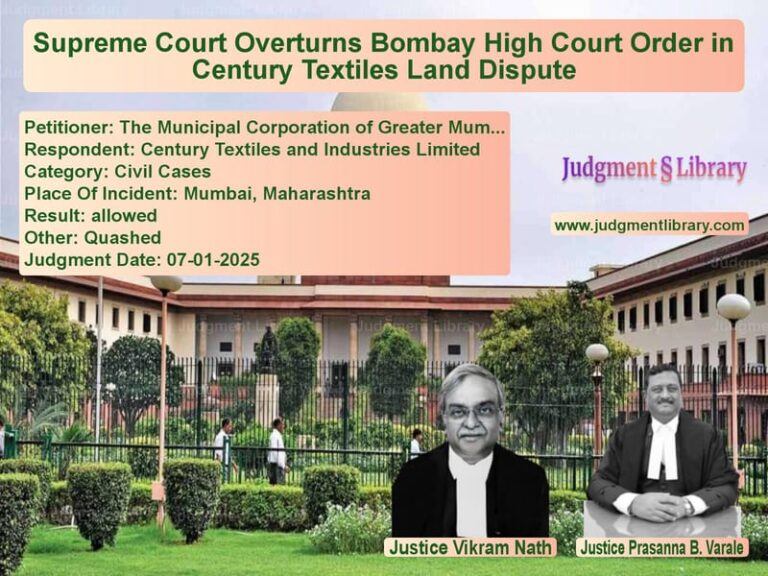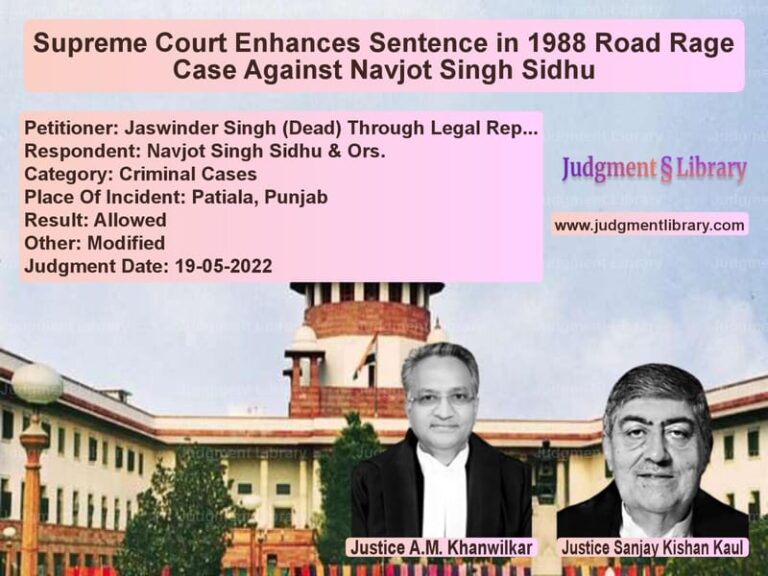Supreme Court Convicts Former MP in Bihar Double Murder Case After 28 Years
The Supreme Court of India has delivered a landmark judgment in Harendra Rai v. The State of Bihar & Ors., convicting former Member of Parliament Prabhunath Singh for his involvement in a double murder case that took place during the 1995 elections. This case highlights the abuse of political power to manipulate the legal system and delay justice for nearly three decades.
Background of the Case
The case dates back to March 25, 1995, when a group of voters, including the deceased Rajendra Rai and Daroga Rai, were returning home after casting their votes in the Bihar elections. The prosecution alleged that Prabhunath Singh, a powerful political leader and candidate for the Bihar People’s Party (BPP), along with his associates, opened fire on the group when they stated they had voted for the rival Janata Dal Party.
The FIR, based on the dying declaration of Rajendra Rai, named Prabhunath Singh as the primary accused. However, due to his political influence, witnesses turned hostile, and the prosecution failed to present crucial evidence. The trial was marred by numerous irregularities, including the failure to produce investigating officers, the intimidation of witnesses, and the questionable conduct of the trial judge.
Key Legal Issues
- Whether the conviction could be based on the dying declaration of the deceased.
- The impact of political influence on the criminal justice system.
- Whether the failure of the prosecution to present key witnesses invalidated the case.
- The role of judicial oversight in cases where trials are manipulated.
Petitioner’s (Harendra Rai) Arguments
- The dying declaration of Rajendra Rai was a direct and voluntary statement implicating Prabhunath Singh.
- The trial court failed to consider crucial evidence due to political interference.
- The acquittal of the accused in the lower courts was the result of a compromised judicial process.
- Witnesses were threatened and abducted, leading to their hostile testimony.
Respondent’s (State of Bihar) Arguments
- The prosecution failed to prove the case beyond a reasonable doubt.
- Most witnesses had turned hostile, making the case weak.
- The trial court and the Patna High Court found no substantial evidence against the accused.
- The FIR was not formally proved as the investigating officers were not presented.
Supreme Court’s Judgment
The Supreme Court overturned the acquittal and convicted Prabhunath Singh under Sections 302 and 307 of the Indian Penal Code. The Court observed:
- On the Dying Declaration: The Court held that a dying declaration, if found reliable, can be the sole basis for conviction. It stated, “The statement of Rajendra Rai, made when he was in a fit state to identify his assailants, is admissible and holds substantial evidentiary value.”
- Political Influence on the Trial: The judgment emphasized that the accused had used his position to manipulate the investigation. The Court noted, “The deliberate delay in the investigation and non-production of crucial witnesses indicate an attempt to shield the accused.”
- Witness Intimidation: The Court acknowledged that key witnesses, including the mother of the deceased, Smt. Lalmuni Devi, had been abducted and forced to give false testimony. It stated, “The intimidation of witnesses is evident from the judicial records, including the findings of the High Court in the Habeas Corpus petition.”
- Failure of the Lower Courts: The Supreme Court criticized the trial judge for failing to ensure a fair trial and disregarding crucial evidence. It observed, “The presiding judge not only allowed the miscarriage of justice but also turned a blind eye to procedural lapses that favored the accused.”
Directions Issued
- Prabhunath Singh was directed to be taken into custody immediately.
- The trial court’s acquittal was overturned, and he was convicted under Sections 302 and 307 IPC.
- The Court ordered the Bihar government to take disciplinary action against officials responsible for the manipulation of the case.
Impact of the Judgment
This case sets a crucial precedent in criminal law and electoral violence:
- Strengthening the Dying Declaration Principle: The ruling reinforces that a dying declaration can serve as the sole basis for conviction if found credible.
- Judicial Oversight in Politically Influenced Trials: The Court emphasized that political interference should not hinder justice.
- Protection of Witnesses: The ruling highlights the need for stronger witness protection mechanisms.
Conclusion
The Supreme Court’s ruling in Harendra Rai v. The State of Bihar & Ors. is a landmark judgment that reaffirms the principle that no one, regardless of their political power, is above the law. The Court’s strong stance against witness intimidation and trial manipulation sends a clear message that the judiciary will intervene when the system is abused. This decision marks a significant step toward ensuring accountability in politically sensitive criminal cases.
Petitioner Name: Harendra Rai.Respondent Name: The State of Bihar & Ors..Judgment By: Justice Vikram Nath, Justice Sanjay Kishan Kaul, Justice Abhay S. Oka.Place Of Incident: Bihar.Judgment Date: 18-08-2023.
Don’t miss out on the full details! Download the complete judgment in PDF format below and gain valuable insights instantly!
Download Judgment: harendra-rai-vs-the-state-of-bihar-&-supreme-court-of-india-judgment-dated-18-08-2023.pdf
Directly Download Judgment: Directly download this Judgment
See all petitions in Murder Cases
See all petitions in Attempt to Murder Cases
See all petitions in SC/ST Act Case
See all petitions in Judgment by Vikram Nath
See all petitions in Judgment by Sanjay Kishan Kaul
See all petitions in Judgment by Abhay S. Oka
See all petitions in allowed
See all petitions in supreme court of India judgments August 2023
See all petitions in 2023 judgments
See all posts in Criminal Cases Category
See all allowed petitions in Criminal Cases Category
See all Dismissed petitions in Criminal Cases Category
See all partially allowed petitions in Criminal Cases Category

